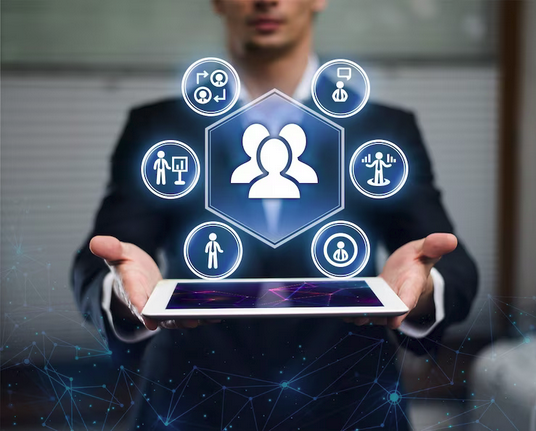Introduction:
In the dynamic landscape of the modern workplace, Human Resources (HR) professionals are increasingly turning to innovative HR software solutions to streamline processes, enhance efficiency, and optimize workforce management. This article explores the top HR software trends that are reshaping the way organizations manage their human capital, providing insights into the evolving nature of the workplace and the role of technology in HR practices.
- Cloud-Based HR Software:
One of the prominent trends in HR software is the widespread adoption of cloud-based solutions. Cloud technology offers flexibility, scalability, and accessibility, enabling HR teams to manage tasks and access data from anywhere at any time. Cloud-based HR software facilitates real-time collaboration, enhances data security, and reduces the burden of maintaining on-premises infrastructure. This trend has become particularly crucial in the wake of remote work becoming a standard practice, ensuring that HR processes remain efficient regardless of employees' physical locations.
- Artificial Intelligence (AI) and Machine Learning (ML):
The integration of AI and ML in HR software is revolutionizing talent management and recruitment processes. These technologies enable HR professionals to analyze vast amounts of data to identify patterns, predict trends, and make data-driven decisions. AI-powered tools can automate mundane tasks such as resume screening, enabling HR teams to focus on more strategic aspects of talent acquisition. Additionally, AI-driven chatbots are being used for employee engagement, providing instant responses to queries and enhancing overall communication within the organization.
- Employee Self-Service Portals:
Employee self-service portals have become a cornerstone of modern HR software. These portals empower employees to manage their personal information, access pay stubs, submit time-off requests, and participate in training programs autonomously. By allowing employees to take control of routine HR-related tasks, self-service portals free up HR professionals to concentrate on more complex responsibilities, fostering a more efficient and employee-centric workplace.
- Mobile HR Applications:
The ubiquity of smartphones has prompted the development of mobile HR applications, enabling employees and HR professionals to stay connected and perform various HR functions on the go. Mobile apps provide accessibility to critical HR information, such as leave balances, performance reviews, and company announcements. This trend is particularly beneficial for remote and field-based employees, promoting a more agile and responsive HR environment.
- Analytics for Decision-Making:
Data analytics has emerged as a powerful tool in HR software, allowing organizations to derive valuable insights from HR-related data. Analytical tools enable HR professionals to assess workforce trends, identify areas for improvement, and make informed decisions to optimize human capital management. By leveraging analytics, organizations can enhance employee engagement, reduce turnover, and align HR strategies with overall business objectives.
- Integration with Other Business Systems:
Efficient HR software is increasingly characterized by its seamless integration with other business systems, such as payroll, finance, and project management tools. Integration eliminates data silos, reduces manual data entry, and ensures data consistency across different departments. This interconnected approach enhances overall organizational efficiency and provides a holistic view of employee data, facilitating better decision-making.
- Cybersecurity and Data Privacy:
As HR software deals with sensitive employee information, cybersecurity and data privacy have become critical considerations. Modern HR software incorporates robust security measures, including encryption, access controls, and regular security updates. Ensuring compliance with data protection regulations is essential, and HR software providers are focusing on building solutions that prioritize the security and privacy of employee data.
Conclusion:
In conclusion, the evolution of HR software is fundamentally reshaping the way organizations manage their human capital. The trends outlined above – cloud-based solutions, AI and ML integration, employee self-service portals, mobile applications, analytics, system integration, and cybersecurity – collectively contribute to a more efficient and responsive HR ecosystem. As organizations strive to adapt to the changing nature of work, investing in advanced HR software becomes imperative for staying competitive and fostering a thriving workplace.
Benefits of these HR software trends are multifaceted. Enhanced efficiency and automation lead to time and cost savings, allowing HR professionals to focus on strategic initiatives. Improved employee self-service options promote empowerment and engagement, contributing to a positive workplace culture. The utilization of AI and analytics facilitates data-driven decision-making, fostering a more agile and adaptable organization. Furthermore, the emphasis on cybersecurity ensures the protection of sensitive employee information, building trust within the workforce.
In the fast-paced and ever-evolving landscape of the modern workplace, embracing these HR software trends is not just a technological choice but a strategic imperative. As organizations continue to prioritize the well-being and productivity of their workforce, the efficient adoption of HR software is a key enabler for success in the contemporary business environment.





Comments